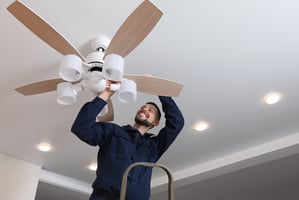Summertime heat in the Washington, DC area can quickly become stifling. With summer practically...
What Do You Know About Your Ceiling Fan?

Ceiling fans are an excellent solution for increased airflow during warm or cold weather. They help circulate the already warm or cold air throughout your house, which also means you don’t need to run the heat or air conditioning as high, potentially saving you money. They are considered the most effective type of circulating fan available for home use.
Ceiling Fan Installation
Installing ceiling fans can be a nuisance, even for experienced DIYers. It can be even more of a challenge when dealing with the old wiring that is common to many homes in the Washington D.C. area.
Ceiling fans should be used in rooms with high ceilings – usually above eight feet – so that the blades can be installed at a recommended floor to ceiling distance. No part of the fan blades or your whole fan should be closer than 7 feet from the floor.
Using a Ceiling Fan
Generally, it is acceptable to leave your ceiling fan on for a long time. It's even safe to leave it on when no one is in the room if the purpose of doing so is to circulate air and maintain consistent room temperature. One advantage of the ceiling fan is that it doesn’t require any floor space or interfere with other design features such as furniture arrangements.
Ceiling fans are smarter, sleeker and quieter than ever. They come in a range of sizes, styles, and options for manual, remote control, or voice-activated operation, but regardless of the bells and whistles, someone needs to install that fan.
If you already have ceiling fans, we can schedule a visit to help you figure out if your current fans are the most energy efficient, or if they should be upgraded to newer and more efficient models that will help you save more money.
Wilcox Electric can do most ceiling fan installations in less than 90 minutes when proper wiring and support are in place. When they’re not, we’ll be honest and realistic with you about any electrical complications and how long we anticipate the extra electrical work to take.



